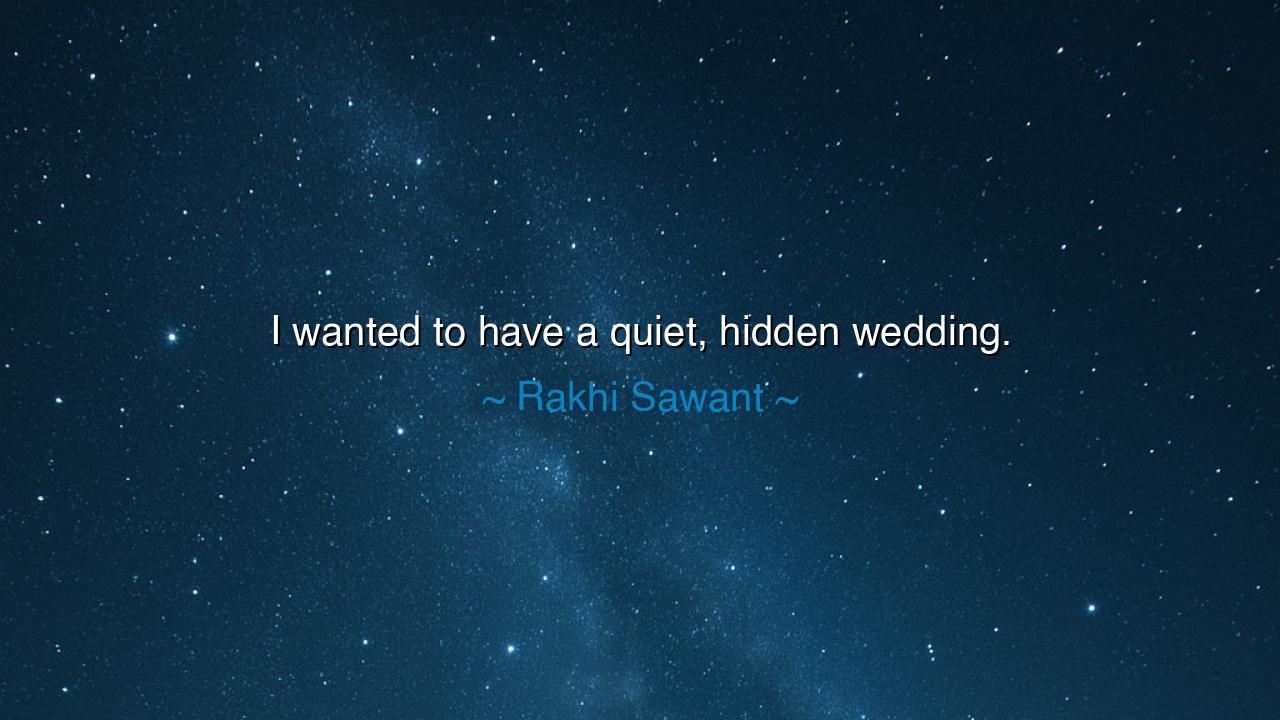
I wanted to have a quiet, hidden wedding.






Hear the quiet words of Rakhi Sawant, spoken with simplicity yet carrying the weight of longing: “I wanted to have a quiet, hidden wedding.” At first glance, these words seem no more than a personal desire, but within them lies an ancient truth: that the most sacred moments of life need not always be displayed before the world. For there are times when joy seeks not applause but silence, when love desires not spectacle but secrecy, and when the holiest vows are whispered in shadow rather than shouted in the marketplace.
A wedding is not merely a gathering of friends, family, and witnesses. At its heart, it is the binding of two souls, a covenant of love and fidelity. Many cultures have adorned this moment with grandeur—banquets, music, and feasting—but beneath the pageantry lies the same eternal vow: to belong to one another in body and spirit. Sawant’s yearning for a quiet, hidden union reveals the essence of marriage stripped of ornament. It is not the noise of celebration that sanctifies the bond, but the depth of commitment spoken between two hearts.
History too remembers such unions. Consider the story of the Roman general Scipio Africanus, whose daughter Cornelia married Tiberius Gracchus in a ceremony free of ostentation. Though she came from wealth and renown, Cornelia chose simplicity, and her life as a devoted mother of the Gracchi brothers became a greater monument than any lavish feast. In contrast, the emperors who lavished gold and pomp upon their weddings are remembered less for love than for spectacle. This shows us that the worth of a marriage lies not in its display, but in its endurance.
To hide a wedding is not to diminish it, but to protect it. For when the eyes of the world press too heavily upon love, they can distort it. Gossip, judgment, and envy often poison what was meant to be pure. The ancients believed that sacred things must sometimes be veiled. The mysteries of Eleusis in Greece were hidden from the crowd, revealed only to the initiated, for they were too holy for careless eyes. So too with love—it is sometimes strongest when it is guarded, when its roots are allowed to deepen in the soil of privacy before blossoming openly to the world.
Sawant’s words remind us of the difference between intimacy and performance. In an age when lives are often lived publicly, displayed like theater upon the stage of society, she points to the older wisdom: that some vows must be shielded, some joys must remain untouched by spectacle. To marry quietly is to choose love over show, depth over appearance, substance over display. It is to say: What matters is not what the world sees, but what we ourselves carry in our hearts.
The lesson is clear: in life’s greatest moments, seek truth, not display. Whether in love, in work, or in faith, let the substance of your commitment outweigh the spectacle of your announcement. The grandest wedding may fade into memory, but the quiet vow, spoken with sincerity, will echo through the years. Guard what is sacred; protect what is holy; let your love be strengthened in silence before it is revealed in light.
In practice, this means: do not measure your life by how loudly it is praised, but by how truly it is lived. If your heart longs for a quiet, hidden path, walk it without shame, for truth needs no audience. Share your joys with those who matter, and let the rest of the world remain outside. What is born in secrecy can grow with strength, and what is nurtured in silence can endure the storms of time.
So let Sawant’s words be passed down as wisdom: the sacred does not always belong to the crowd. There is power in the hidden, beauty in the quiet, and strength in the vows whispered in silence. For love that does not depend on display is love that endures, and the quiet wedding, though unseen by many, may be greater than the grandest celebration.






HGvu huong giang
Rakhi Sawant’s wish for a quiet, hidden wedding seems like an effort to reclaim a sense of normalcy away from the spotlight. It got me thinking—why do so many celebrities opt for grand public weddings? Is it the need for validation or simply the pressure to create a spectacle? Shouldn’t a wedding be about the couple’s happiness and not about being a public event? What do you think—are hidden weddings becoming a trend for celebrities trying to regain their privacy?
TVNguyen Thi Thao Vi
I find it intriguing how Rakhi Sawant expresses a desire for a quiet, hidden wedding. It speaks to the tension between living a public life and wanting personal moments to remain private. Does this make you wonder if celebrity weddings are more about media attention than the celebration itself? How much does the desire for privacy impact their relationships, and do we respect that need for seclusion enough?
HTkim thi hoai thu
Rakhi Sawant’s statement about wanting a quiet, hidden wedding made me think about the different reasons people might want their weddings to be private. For someone like her, who’s often in the limelight, it’s understandable that she would seek a more private celebration. Do you think this desire for privacy is a common sentiment among people in the public eye, or do some prefer to make their weddings public to further their brand?
TNthanh nhan
Rakhi Sawant’s desire for a quiet, hidden wedding seems like a reflection of her desire for privacy amidst the public attention she often receives. It’s interesting how some people with high profiles yearn for such personal moments to remain intimate. Does this desire for secrecy stem from wanting to escape the pressure of public expectations, or is it more about preserving the sanctity of such a special event? How do you think public figures balance their privacy with their fame?